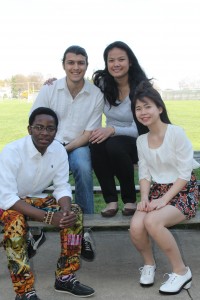My last undergraduate year does not only consist of hours upon hours of writing my senior Independent Study thesis, but it also consists of my work with the Ambassadors Program. The Ambassadors Program is a signature program of the Center of Diversity and Inclusion at The College of Wooster. Every year, through a highly selective process that includes multiple essay writing, interview, and mock presentations, the Center chooses 4-5 international students and/or Global Nomad to be a student ambassador of their home countries. The Ambassadors receive grant to conduct field research on different aspects of their culture during the summer. When they return to campus in the Fall through the end of the Spring semester, Ambassadors go around campus and local communities to present about their countries.
This experience has been very rewarding to me for many reasons. I get to introduce my culture to many people, meet new people on campus and in the community, develop my skills in effective communication, and, most importantly, learn a lot about my own culture.

Clockwise: Indonesia, Vietnam, Zambia, Paraguay.
Photo by Yorgun Marcel
1. Introducing Indonesian Culture
Let’s face it – not a lot of people in the United States know anything about Indonesia, let alone knowing anything about the culture. So, it is always fun to introduce them to our country. I usually start my presentations with the fun fact that President Obama used to live in my hometown, Jakarta. This always catches the attention of a lot of audience members. Then, I talk about other simple facts such as where Indonesia is in the world map, the size compared to the United States, the number of islands that the country has, as well as the weather that is pretty much summer all year long. I also use many artifacts to help me in presentations. Some of the artifacts that I use include wayang puppets, batik clothing, and angklung. My goal is usually simple – I want them to leave the room knowing something about Indonesia, either it is the location, the music, or even the existence of the country itself. In my short 15-20 minutes presentations, that is, I believe, an appropriate goal.

2. Develop My Skills in Effective Communication
In all honesty, this is the main reason why I want to be an Ambassador. I want to be a better presenter. I want to practice crafting presentations that effectively communicate the information and ideas that I would like to share with the audience. I have a number of friends that have “graduated” from this program and I saw how they have become a much more confident public speaker after the program. I have only been an ambassador for about three months and with an average of about 2 presentations per week, I can already feel that I am getting better at executing presentations.
Skills in effective communication is very valuable. In school, I am expected to be able to express my ideas efficiently, whether it is in formal presentations or in informal class discussions. Beyond the classroom, employers look for communication skills in hiring in addition to other technical skills.
3. Meeting New People
Through this program, I have presented in many classes in many different departments on campus: education, anthropology, communication studies, biology, and many more. The people that I met in these presentations, both professors and students, I would not have the chance to meet otherwise. Most presentations are requested, i.e. professors asked the Ambassadors Program if one of the Ambassadors can present in their classes about certain parts of the Ambassadors’ native culture that would enhance the learning of students in the class. Thus, both professors and students are usually very excited to see Ambassadors speak in class and very engaged about the topic, which make the presentation even more interesting for ambassadors.
Additionally, I shape my presentations to fit the different type of classes that I present on. In order to do so, to some degree I need to understand what the learning objectives of the class are and how they are planned to be achieved. In this way, the Ambassadors Program is a great venue for me to expand on my liberal arts education.
The Ambassadors Program, more importantly, allows me to also connect with community members outside of campus. Ambassadors present at local elementary, middle, and high schools, retirement communities, as well as other groups in the community. Going to a residential college such as Wooster, most of the things that the students need is available on campus. Most of the time, students live in the campus bubble because we really do not need to go off campus at all. We know very little about the City of Wooster itself, let alone getting acquainted with its people. The Ambassadors Program allows me to slowly break the campus bubble. My discussions with local community members during my presentations allow me to taste just a little bit of the experience living in a small town in the Midwest of the United States.

Photo by Amyaz Moledina
4. Learn About My Own Culture
The most important part of this experience is, I believe, is the opportunity to learn more about my own culture. There are a lot of aspects of Indonesian culture that I don’t know anything about, thus in every presentation that I give, I learn something new. There is a wide range of topics that I have presented so far: fashion, education, coffee, even jazz music scene in Indonesia. Of course I was not the master of all of these topics. I had to learn and familiarize myself with them first and I am really enjoying the process of learning about them.
I am grateful for my experience with the Ambassadors Program. It is still a long way to go and I cannot wait to see what is more to come. Wish me luck!
Photos are Author’s personal collection.
Featured Image is credit to Jola Pham.







